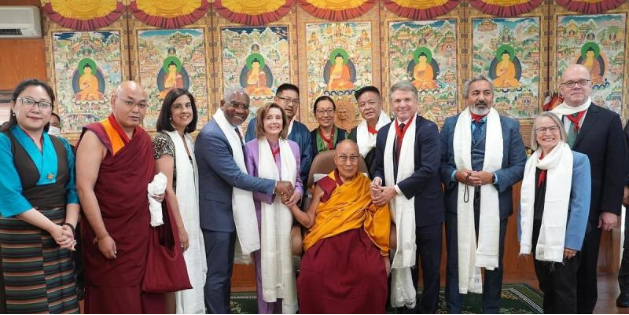
US Lawmakers Meet Dalai Lama in Dharamsala, Vow to Block China’s Influence on Tibetan Leadership Succession
By Fiona Nanna, ForeMedia News
5 minutes read. Updated 4:00PM GMT Fri, June 21, 2024
A group of U.S. lawmakers met with the Dalai Lama in Dharamsala, India, on Wednesday, declaring their resolve to prevent China from influencing the selection of his successor. This statement is likely to provoke a strong response from Beijing, which views the exiled Tibetan spiritual leader as a separatist.
The delegation, comprising seven bipartisan members led by Republican Representative Michael McCaul of Texas, emphasized their commitment to thwart China’s attempts to control the Dalai Lama’s succession. McCaul, who also chairs the House Foreign Affairs Committee, affirmed this during a public reception at the Dalai Lama’s monastery in Dharamsala.
“It is still my hope that one day the Dalai Lama and his people will return to Tibet in peace,” McCaul declared, underscoring the spiritual and cultural significance of the Dalai Lama’s return to Tibet.
This development occurs against a backdrop of strained US-China relations, as Washington and Beijing endeavor to stabilize their interactions. Meanwhile, India continues to push for lasting peace along its disputed Himalayan border with China, four years after a violent military clash strained bilateral ties.
The U.S. lawmakers indicated that Washington would pressure Beijing to resume talks with Tibetan leaders, which have been stalled since 2010. They also introduced a bill, expected to be signed by President Joe Biden, aimed at promoting a resolution to the Tibet-China dispute. Although Washington officially recognizes Tibet as part of China, the bill’s implications suggest a potential shift in this stance, which could have significant diplomatic repercussions.
The Dalai Lama, who fled to India in 1959 following a failed uprising against Chinese rule, has long been a contentious figure in Sino-Tibetan relations. At 88 years old and facing ongoing health issues, he is scheduled to travel to the United States for medical treatment this week.
Tibetan tradition holds that the Dalai Lama is reincarnated after death, with the current leader suggesting his successor might be found in India. Beijing, however, insists on its right to approve the successor, a legacy it claims from the era of China’s emperors.
The U.S. lawmakers’ visit, which included Democratic former House Speaker Nancy Pelosi, marked a significant diplomatic gesture. Pelosi stated that the “Promoting a Resolution to the Tibet-China Dispute Act,” or the Resolve Tibet Act, sends a clear message to Beijing.
“This bill says to the Chinese government: things have changed now, get ready for that,” Pelosi proclaimed, receiving applause from hundreds of Tibetans.
Photographs on the Dalai Lama’s website captured the spiritual leader holding a framed copy of the bill, flanked by the visiting lawmakers. Beijing has expressed serious concern over the bill and the visit, urging U.S. officials to avoid contact with what it terms the “Dalai clique” and cautioning President Biden against signing the legislation.
The Indian foreign ministry has yet to comment on the lawmakers’ visit. However, the ongoing tensions between India and China, particularly following the 2020 border clashes, have seen New Delhi and Washington grow closer.
While Chinese officials typically object to any foreign engagement with the Dalai Lama, the legislative approval of the bill poses a greater concern for Beijing than any potential meeting between the Tibetan leader and President Biden.
Robert Barnett, a Tibet specialist from the School of Oriental and African Studies (SOAS) in London, remarked, “Presidential assent for the bill would be far more concerning for China than whether Biden or any other leader meets the Dalai Lama.”
Penpa Tsering, the political leader of the exiled Tibetan government, hailed the congressional approval of the bill as a “significant breakthrough.” In an interview with Reuters, Tsering expressed hope that it would pressure Beijing to negotiate and potentially inspire other nations to adopt similar policies.
“This will give us a tool to work with other governments,” Tsering stated from his office in Dharamsala. He emphasized that the Dalai Lama has consistently sought “autonomy or a middle way, not independence” for Tibet.
This meeting between U.S. lawmakers and the Dalai Lama marks a pivotal moment in international diplomacy, reflecting the ongoing complexities in Sino-Tibetan relations and the broader geopolitical landscape.
For more updates on this developing story, visit Reuters and BBC News.

